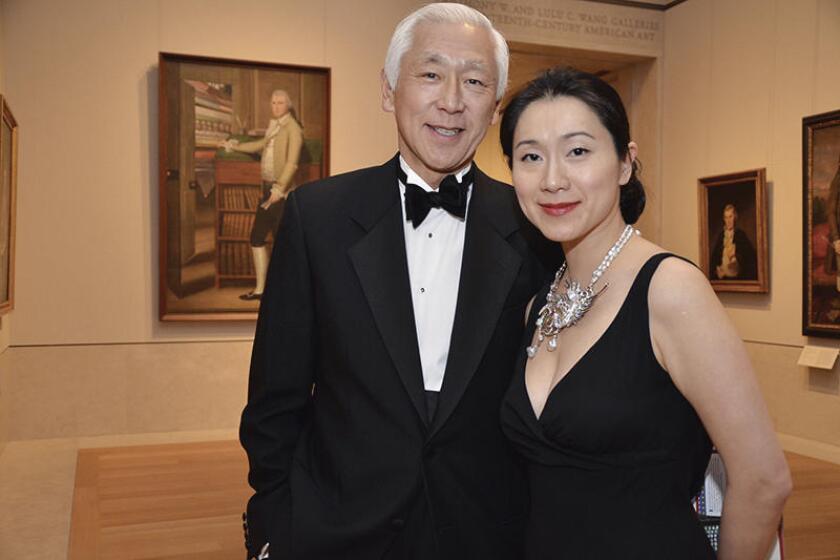When communists were taking control of China in 1949, Oscar Tang was an 11-year-old stuck in the middle of the chaos in Shanghai. His parents, who were visiting Boston, quickly arranged for him and his older sister to be spirited out of the country, leaving everything behind. Mr. Tang was sent to St. Johnsbury Academy in Vermont, where he was the only Chinese student. He spoke no English and felt lost amid the Westerners, so he devoured books about Chinese civilization.
“I needed a source of strength, a source for where I came from.”
As an adult, he became a successful financier and generous philanthropist who has donated at least $100 million. He hopes he can help Americans thrive in a world in which China is such a force by increasing understanding of the early civilization and culture that gave him so much emotional and intellectual sustenance.
This month marks the opening of a center to do that. His gift of $5 million has helped Columbia University establish the Tang Center for Early China, which will explore the country’s history and culture. Programs will be designed to reach both the public and students.
Knowledge of ancient Chinese history is essential if Americans expect to understand a world in which China has become the most important country that America must interact with, says Mr. Tang.
“You’re dealing with a people that will look to their own history to lead them to whatever their policy conclusions might be.”
He applauds philanthropic efforts like the financier Stephen Schwarzman’s $100-million commitment to build the equivalent of a Rhodes Scholars program in China. But Mr. Tang sees a need to do more than train American business leaders to understand Chinese entrepreneurs. “Somewhere we need to go back to the study of the foundations of where this civilization came from,” he says.

Here’s what drives much of the giving by Mr. Tang and his wife, Agnes Hsu-Tang:
Promoting Education and Honoring Family
Mr. Tang says one of his most important gifts was a $25-million donation in 2008 to Phillips Academy Andover. He credits the school, from which he graduated, with setting him and his first wife — who attended its affiliated girls school — on a path to success.
Mr. Tang made the donation when he was serving as president of the academy’s Board of Trustees and leading the institution’s campaign to raise money for need-blind admissions. He says he decided to give such a big sum because he wanted to encourage alumni to bolster the school’s scholarship aid so that anybody who was qualified, regardless of family wealth, could attend.
“A place like Andover is a privileged institution, but with that privilege comes an obligation to be as open as possible to all quarters,” says Mr. Tang. “That is, after all, the idealized picture of America, and the opportunity which it provides.”
Mr. Tang’s commitment to Phillips was not the only way he showed his dedication to education and to his first wife, who died in 1992: He also donated $10.2 million in her honor to Skidmore College, her alma mater.
Leading by Example
Mr. Tang and Ms. Hsu-Tang take seriously the need to demonstrate that Chinese-Americans — and others not born in the United States — are generous.
“We’re Chinese-Americans; we didn’t come over on the Mayflower, and it’s important for us to declare that we are Americans,” says Mr. Tang. “This country has been open to us, so it’s our obligation to return that privilege through participation in philanthropy and through the example of participation.”
In 2013, when the two were in the throes of planning their wedding, Mr. Tang was approached by the New-York Historical Society to be a lead donor for an exhibit on the history of Chinese-Americans.
“At first we were going to move forward anonymously,” says Ms. Hsu-Tang. “But I felt strongly that here’s the first exhibition of Chinese in America, and shouldn’t we be the principal sponsor to lead by example as Chinese-Americans? In this case, being anonymous didn’t make any sense.”
Phillips
Academy Andover
$50 million
Including $25 million to help the private school become need-blind and $15 million
for the Tang Institute at Andover, a center for creative approaches to education.
Metropolitan Museum
of Art
$30 million
To purchase rare Chinese artworks, to create an endowment for the Department of Asian Art, and to support the hiring of new staff members and creation of new programs.
Skidmore College
$10.2 million
To establish the Frances Young Tang Teaching Museum and Art Gallery in honor of Mr. Tang’s first wife, an alumnus of the college who died in 1992.
COLUMBIA UNIVERSITY
$5 million
To create the Tang Center
for Early China.
Drawing on Faith to Guide Donations
Ms. Hsu-Tang believes everyone, even those of modest wealth, must give, a commitment she traces back to a religious upbringing. Her family is the oldest Catholic family in China — she can trace back to 1599 an ancestor who was the first Chinese person to convert to the religion.
“Even when I was an impoverished grad student,” says Mr. Hsu-Tang, “I always gave away 10 percent of what I had, because I was lucky to be in a position where I could at least put food on the table for myself.”
Regardless of where the motivation to give originates, says Mr. Tang, he sees the role of philanthropists as one of America’s strengths, and he hopes China will emulate the U.S. approach to giving.
“Private philanthropy, and not just in terms of financial giving but in terms of citizens’ participation in organizations and the distributed decision making that creates, is one of the real strengths of this country,” he says. “One of my hopes is that the society from which I came will adopt that American model.”

version of this article appeared in the September 1, 2015, issue.
We welcome your thoughts and questions about this article. Please email the editors or submit a letter for publication.








